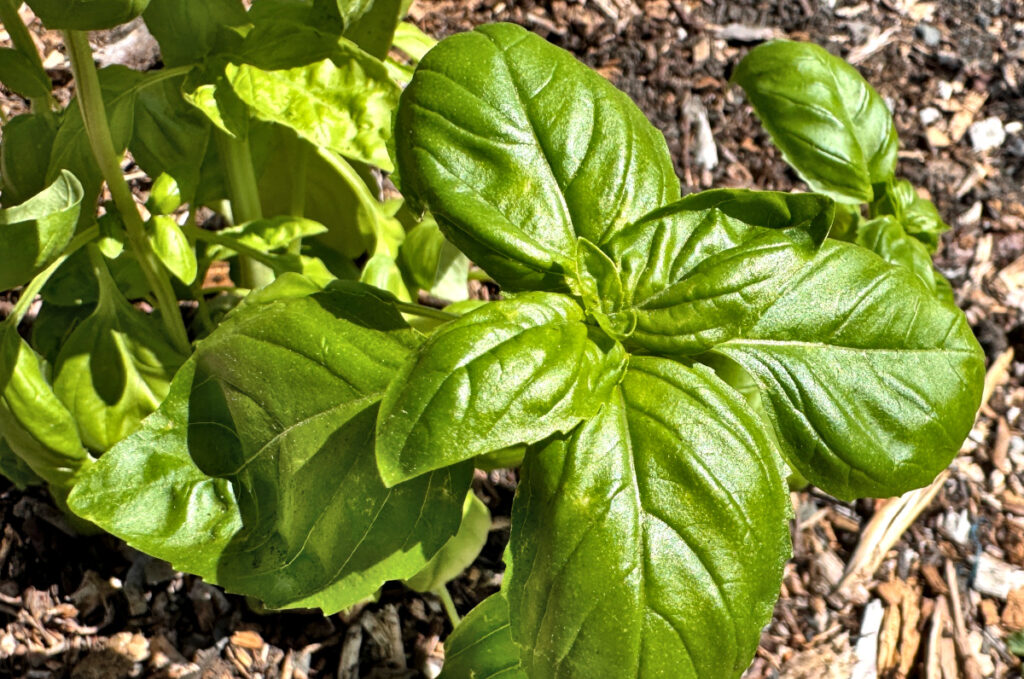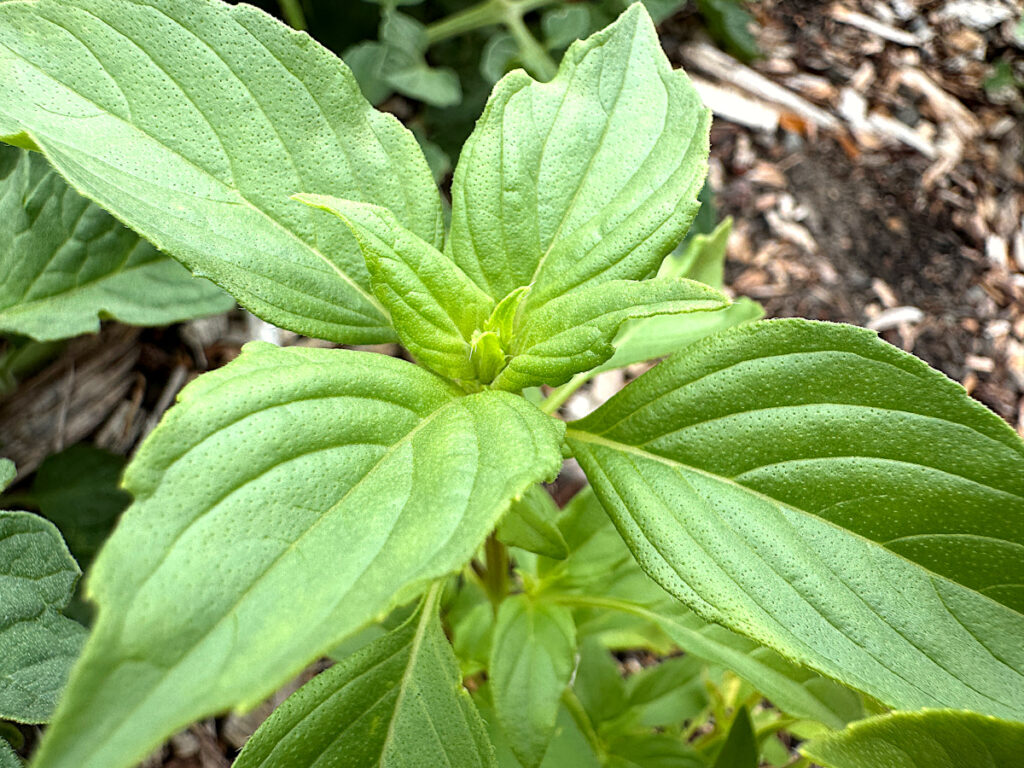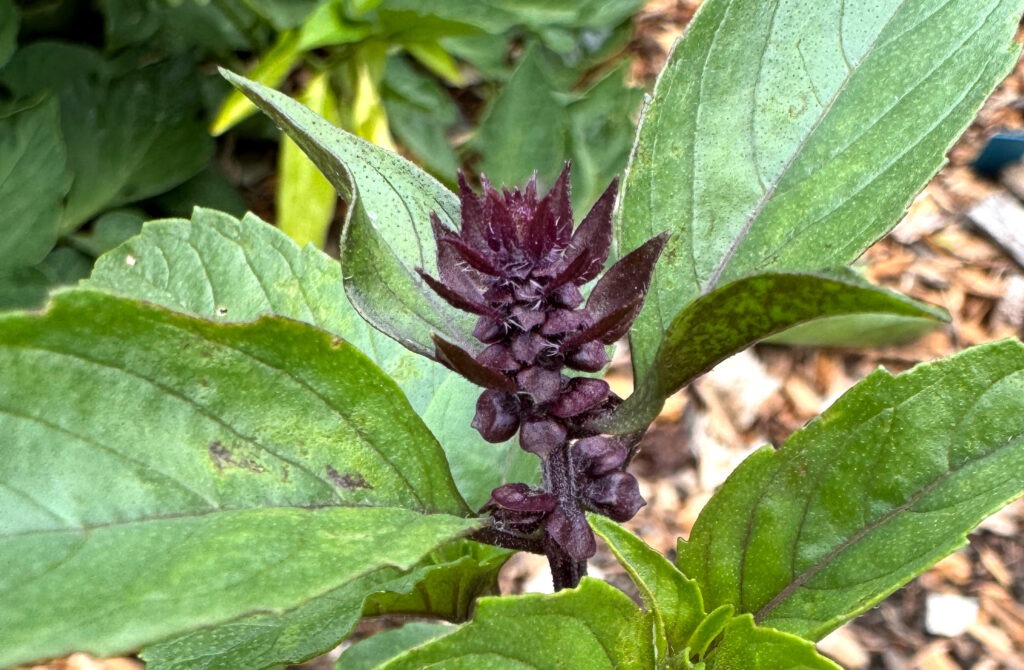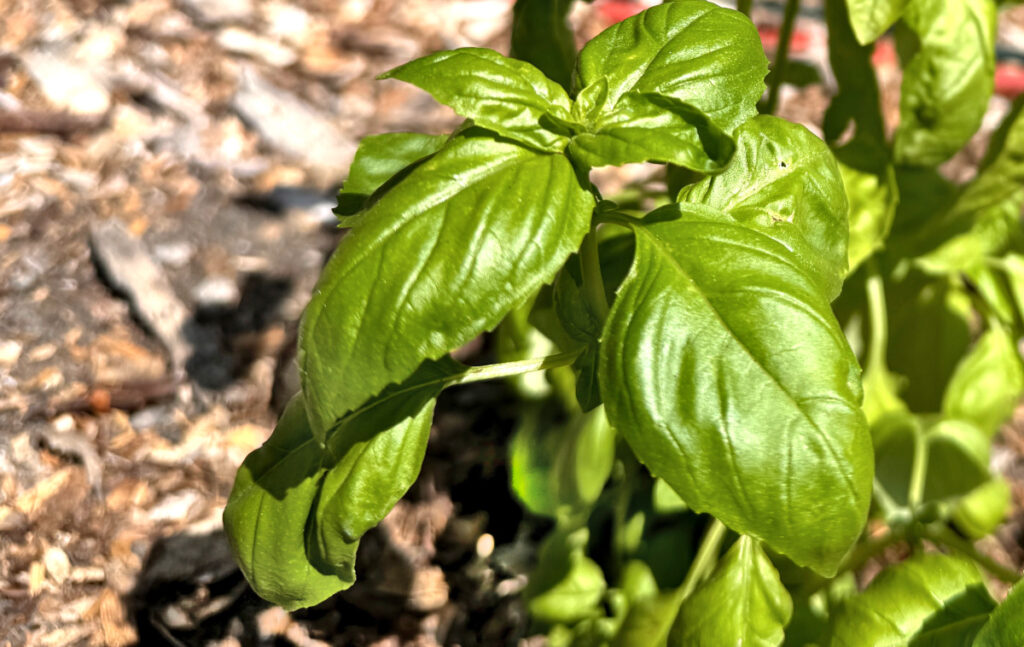Unlock the Healing Power of Basil: Health Benefits You Need to Know
You probably know sweet basil, Ocimum basilicum, as a key ingredient in some of your favorite dishes: from pasta sauces to fresh pesto. But did you know the health benefits of basil means this aromatic herb has been used for centuries as a powerful natural remedy? In this post, we’ll explore how basil can support your well-being and how you can incorporate its benefits into your daily life.

How to Identify Basil
Basil is a leafy herb with leaves that range in color from bright green to deep purple, depending on the variety. Its leaves are smooth, oval-shaped, and have a slightly pointed tip. The plant itself has a bushy, upright growth habit, and its stems are sturdy and green, sometimes tinged with purple in certain varieties. When basil is in bloom, it produces small, white or purple flowers clustered at the tips of its stems.
The leaves are wonderfully fragrant and are the part of the plant cherished for culinary purposes. The leaves also make a very refreshing tea.
Basil has the typical square stem of members in the mint family of plants. It originated in the Mediterranean region of the world but has spread to many other countries and is used in many different types of cuisines. Here in the U.S. it’s most popular in Italian dishes such as pastas and pestos, but is also very popular in Thai cuisine as well.
In this post, we’ll explore the pharmacological uses of basil and how you can incorporate it into your lifestyle for improved health. There are many different types of basil, but the basil discussed in this post is sweet basil, Ocimum basilicum.

Health Benefits of Basil
*I am not a doctor and this is not medical advice. Please consult a physician before using herbs for medicinal purposes.
The Power of Basil: Fighting Germs and Aging with Nature’s Medicine
One common theme in members of the mint family is their delight in killing things, bacteria and other microbes to be specific. Basil is no exception, and its antimicrobial properties make it perfect for targeting bacterial infections. It works by breaking down the cell walls of the bacteria, effectively killing it off. Isn’t that cool!!
Basil also has strong anti-inflammatory effects, which can help reduce inflammation in the body which help in fighting infections and can also help alleviate symptoms related to other inflammatory conditions like arthritis.
It’s anti-inflammatory properties, along with its antibacterial and antifungal properties, make it a good addition for skin issues and wounds as well. Using it as a poultice can help wounds, insect or snake bites. It has even shown some benefits for helping acne. A cream made with basil-infused oil could be a great addition to your teenager’s and/or your own skin care routine.
There is some evidence that basil can help with aging skin by adding moisture, helping with wrinkles and roughness as well as scaliness that’s common as you age. These benefits may help lead to smoother and younger looking skin. As with anything, this may not work for everyone so don’t expect miracles. Especially don’t expect miracles overnight. Anti-aging products are a multi-million dollar business. Basil may help, but it takes more than just basil to have beautiful, smooth skin.
Antioxidant, Anti-Cancer and Radio Protective Properties
Free radicals are harmful substances that move around your body and create a host of issues, from inflammatory diseases all the way to cancer. Antioxidants are things that help protect our bodies from free radicals. Basil has shown very good antioxidant properties with potential power to help fight the health issues free radicals cause. Basil may help with a wide spectrum of inflammatory diseases, protecting your liver, reducing ulcers, and helping support your central nervous system.
According to some studies the antioxidant properties of basil have potential anti-cancer activity, too. These studies have suggested that these compounds in basil can help protect against certain types of cancer by inhibiting the growth of cancer cells. Regular consumption of basil, whether fresh, dried for tea and cooking, or as a tincture, may possibly reduce the risk of cancer.
In addition to cancer prevention, basil has shown radioprotective activity, which means it can help shield the body from harmful effects of radiation. This property could potentially be beneficial for radiation therapy for cancer and other radiation exposure in medical circumstances. It could also help protect your body from environmental radiation as well. The potential health benefits of basil in this area are super exciting!
Stress Reduction, Digestion, and Immune Support
Basil has been shown to have anti-stress properties, making it a natural remedy for those looking to find balance. A nice cup of basil tea in the morning (or any time of day) may be what your body needs to let stress go or start your day off right.
Basil tea, in particular, is known for its ability to relieve digestive issues such as nausea, flatulence, and dysentery. If you’re struggling with any of these common ailments, a warm cup of basil tea might be just what you need. Basil can also improves digestion, act as a mild laxative, and may even aid in relieving symptoms of indigestion. In some regions of the world, basil is used in a variety of forms, including infusions and decoctions, to treat ailments like malaria, diarrhea, and burning urination.
The health benefits of basil extend to being an immunomodulator, meaning it helps regulate and strengthen the immune system, offering enhanced protection against illnesses. Immunomodulator means that basil can help ramp up your immune system when necessary. It also means it may help it calm down when it’s overactive. Overactive immune systems are typical of people suffering from autoimmune issues.
Other Health Benefits of Basil
Diabetes Management: Studies indicate that basil may help regulate blood sugar levels, making it beneficial for those with diabetes.
Cardiovascular Health: Basil’s benefits extend to cardiovascular health, as it has been linked to reduced cholesterol and blood pressure levels.
Analgesic Effects: Acting as a natural pain reliever.
Larvicidal Activity: Helping to control insect populations.

How You Can Use Basil As Medicine
There are several ways you can use basil as medicine:
- Eat it
- Make a tea
- Use it as a tincture
- Infuse it in oil
These four ways are going to be my standard answer for how to use herbs as medicine, and are definitely the best ways for culinary herbs like basil.
Eating Basil
Using it to flavor dishes will help you gain some of its medicinal benefits. Cooking does break the nutritional and medicinal properties down some, but you can still enjoy some benefits by eating it. If you eat it raw as a topper for your meal or in a pesto, you’ll get even more of those delicious and medicinal properties.
Making a Tea to Extract Medicinal Properties
To make basil into a tea, take either fresh or dried basil and put about a teaspoon dried basil (2 teaspoons fresh) per cup into a tea bag or infuser. Poor 8 oz of boiling water over it and cover the cup to keep the steam from escaping. There are special tea mugs you can buy that come with covers, or you can just cover the cup with a small saucer plate like I do.
Let the tea steep for about 10-15 minutes then remove the cover. Take out the basil and enjoy your refreshing medicinal tea. You can also chill basil tea and drink it cold. It’s very refreshing on those hot summer days!
Making a Tincture
Tinctures typically involve alcohol but can be made with vegetable glycerin or vinegar if you do not consume alcohol. Keep in mind that when you are taking a tincture, you are taking such small amounts that it is impossible to feel any effects of alcohol.
I make a tincture by using 100 proof vodka. Fill a jar with fresh basil. I like to cut it up into smaller pieces so I can fit more in and have more surface area for the alcohol to extract from. I feel it’s important that the plant be fresh, so it still retains all of its water and alcohol soluble properties. Some people like to use dry plant matter, but I don’t think it’s as potent since it’s lost its water-soluble properties in the drying process. Use your own judgement on what works best for you. Make sure you fill the jar to the top with basil, don’t pick a jar that’s larger than the amount of plant material you have. It doesn’t matter what jar you use, just make sure it has a lid that is tight.
When your jar is full of basil, pour the alcohol over it until it reaches the brim of the jar. You may have to let it sit for a minute before the alcohol makes it into all the nooks and crannies. Add more if necessary. Seal the jar with the lid and sit it in a cool dark place for 6-8 weeks.
When it’s ready, strain out the plant material and your tincture is ready for use.
Tinctures are pretty powerful medicine, so start slowly when taking it. Start with just a few drops several times a day, and work up until you reach the number of drops your body needs to feel the medicinal affects.
Making an Oil Infusion
An oil infusion is best used to make a salve, cream or lotion, but of course you can always use the oil to cook with too! My favorite oil to use is avocado oil, but you can use a pure olive oil, grapeseed oil, or basically any oil that isn’t soy or canola based. I wouldn’t recommend using either of those due to their inflammatory properties.
Oil infusions should be made with dry plant material only. Because oil and water are the perfect breeding ground for bacteria, if you use fresh plant material your oil is going to end up growing mold.
Fill a jar up with dried basil, you can use the stem and all, you don’t have to only use the leaves. Just like with a tincture, cut the plant matter into smaller pieces to allow more surface area for extraction.
Pour the oil over the plant material up to the rim of the jar. Cap it tight and place it in a warm, dark place for 6 weeks. After 6 weeks, strain out the plant material and your oil is ready to go!

Have you ever tried basil tea or found that the health benefits of basil have improved your wellness? Share your experiences in the comments below!
Sources:
Biological and Pharmacological Properties of the Sweet Basil (Ocimum basilicum)
STUDY OF ANTIOXIDANT AND ANTIMICROBIAL ACTIVITY OF SWEET BASIL (OCIMUM BASILICUM) ESSENTIAL OIL






